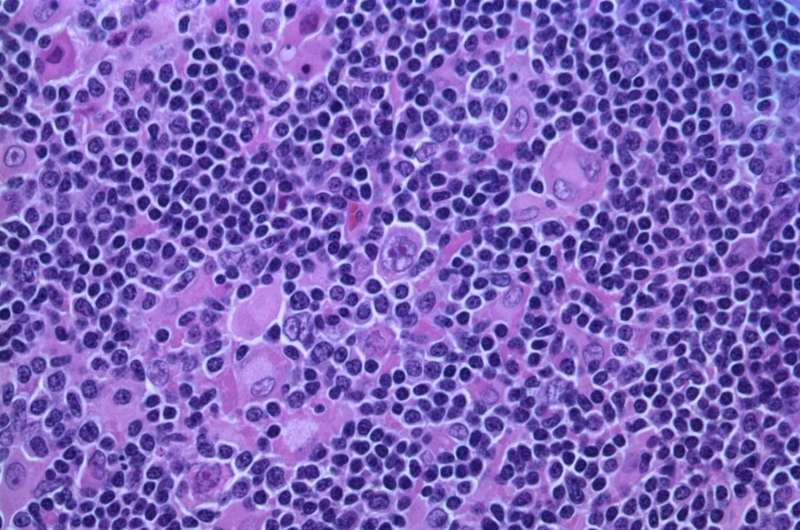Home » Health News »
Promising new treatment for patients with diffuse large B-cell lymphoma

A study from Memorial Sloan Kettering Cancer Center (MSK) published today in the New England Journal of Medicine (NEJM), found that in patients with previously untreated Diffuse Large B-Cell Lymphoma (DLBCL) Polatuzumab vedotin with Rituximab, Cyclophosphamide, Doxorubicin, and Prednisone (pola-R-CHP) resulted in a 27 percent reduction in risk of disease progression or death compared with the current standard of care of Rituximab, Cyclophosphamide, Doxorubicin, Vincristine and Prednisone (R-CHOP) therapy. Results from this Phase 3 trial were presented by Gilles Salles, MD, Ph.D., Chief of the Lymphoma Service at MSK, on December 13 during a media preview of the 63rd American Society of Hematology (ASH) Annual Meeting and Exposition.
“Diffuse Large B-Cell Lymphoma is the most prevalent form of lymphoma and one of the most common hematological malignances. Over the last two decades, there have been multiple attempts—albeit unsuccessful—to improve the cure rate of this disease either through modified dose, schedule of R-CHOP or by adding targeted agents to this regimen,” said Dr. Salles. “This study shows that R-CHP in combination with Polatuzumab vedotin significantly improves progression-free survival rates for patients with Diffuse Large B-Cell Lymphoma and results in a sizable reduction in the relapse risk after successful treatment completion, avoiding the use of salvage therapies that are often unsuccessful and associated with significant toxicity burden.”
R-CHOP is the current standard of care for patients with newly diagnosed DLBCL. However, only 60 to 70 percent of patients are cured with R-CHOP and many DLBCL patients relapse after receiving the treatment. Additionally, patients with high risk factors, such as a high International Prognostic Index (IPI) score, are likely to experience poorer outcomes.
Polatuzumab vedotin is an antibody-drug conjugate targeting CD79b, which is ubiquitously expressed on the surface of malignant B cells. In the trial conducted at MSK, and other international centers, investigators replaced Vincristine with Polatuzumab vedotin and compared the new regimen with R-CHOP. In the POLARIX trial—a double-blind, placebo-controlled, Phase 3 study—879 patients aged 18–80 years with previously untreated intermediate and high-risk DLBCL were randomized 1:1 to receive six cycles of pola-R-CHP or R-CHOP, plus two cycles of Rituximab alone. The primary endpoint was investigator-assessed progression-free survival. Secondary endpoints included overall survival and safety.
After a median follow-up of 28.2 months, the two-year progression-free survival rate was 76.7 percent versus 70.2 percent, superior with pola-R-CHP versus R-CHOP. The study found no difference in overall survival between treatment arms and the safety profile was comparable for pola-R-CHP versus R-CHOP. These results support the use of pola-R-CHP in the initial treatment of this similarly aged population.
Source: Read Full Article



